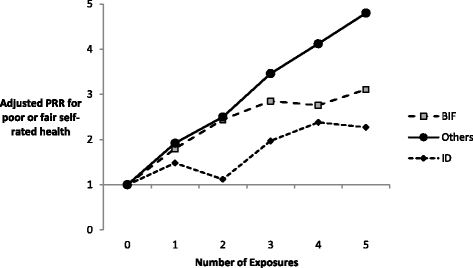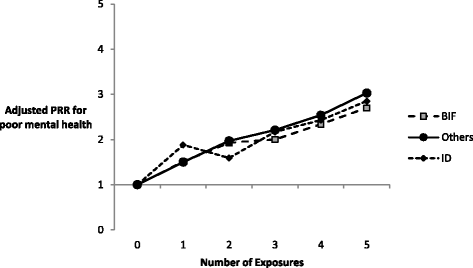The association between employment status and health among British adults with and without intellectual impairments: cross-sectional analyses of a cohort study
- PMID: 29587712
- PMCID: PMC5870818
- DOI: 10.1186/s12889-018-5337-5
The association between employment status and health among British adults with and without intellectual impairments: cross-sectional analyses of a cohort study
Abstract
Background: There exists a well established link between employment status and health, with unemployment being associated with poorer health. Much less is known about the association between economic inactivity and health, especially among people with disabilities. Our aim is to determine whether the association between employment status and health is similar for adults with and adults without intellectual impairment.
Methods: Using nationally representative data from the 1970 British Cohort Study, we undertook a series of cross sectional analyses of the association between employment status and health (self-reported general health, mental health) among British adults with and without intellectual impairments at ages 26, 30, 34, 38 and 42.
Results: People with intellectual disability and borderline intellectual functioning had markedly lower employment rates and poorer health than other participants at all waves of data collection. When compared with participants in full-time employment the prevalence of poorer self rated health and mental health was higher among participants with and without intellectual impairment who were in either part-time employment or were economically inactive at all ages. When compared with participants in employment the prevalence of poorer self rated health and mental health was higher among participants with and without intellectual impairment who were in the economically inactive categories of unemployment, education/training and ill/disabled at all ages. Intellectual disability status appeared to moderate the strength of the relationship between economic activity and self-rated health and, to a much lesser extent, the relationship between economic activity and mental health. In all instances the moderation indicated a stronger association among participants without intellectual impairment.
Conclusions: The results provide substantive evidence to suggest that the nature of the well-established association between employment and better health is similar for British adults with and without intellectual impairments. The results do, however, indicate that the magnitude of the effect involved differed. Further research is needed to identify mechanisms that may underlie this difference.
Keywords: Borderline intellectual functioning; Cognitive ability; Employment; Health; Intellectual disability; Intellectual impairment.
Conflict of interest statement
Ethics approval and consent to participate
NHS Research Ethics Committees ethical approval was sought and granted for BCS70 follow-ups from 2000 on. Available records suggest that only internal university-based ethical review was sought for previous surveys [35]. The datasets analyzed during the current study are available to registered researchers through the UK Data Service repository who gave permission for us to use these data.
Consent for publication
Not applicable
Competing interests
The authors declare that they have no competing interests.
Publisher’s Note
Springer Nature remains neutral with regard to jurisdictional claims in published maps and institutional affiliations.
Figures


References
-
- Avendano M, Berkman LF. Labor markets, employment policies, and health. In: Berkman LF, Kawachi I, Glymour MM, editors. Social Epidemiology. Oxford: Oxford University Press; 2014. pp. 182–233.
-
- Bartley M, Ferrie J, Montgomery SM. Health and labour market disadvantage: unemployment, non-employment, and job insecurity. In: Marmot M, Wilkinson RG, editors. Social determinants of health. Oxford: Oxford University Press; 2006. pp. 78–96.
Publication types
MeSH terms
LinkOut - more resources
Full Text Sources
Other Literature Sources

